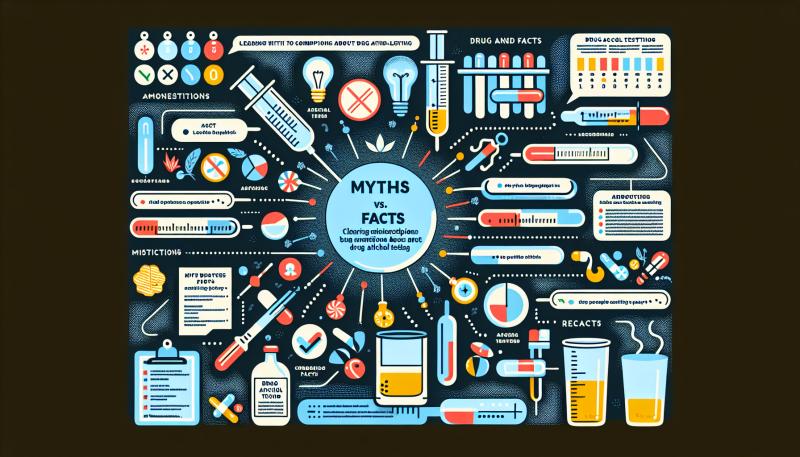There are no items in your cart.
Myths vs. Facts: Clearing Up Misconceptions About Drug and Alcohol Testing
Drug and alcohol testing often sparks a mix of opinions and beliefs. Unfortunately, many misconceptions can lead to confusion and unnecessary anxiety. In this post, we aim to debunk some prevalent myths and present solid facts to foster a better understanding of drug and alcohol testing.
Myth vs. Fact: The Purpose of Testing
- Myth: Drug and alcohol tests are only conducted to punish individuals.
- Fact: The primary purpose of these tests is to ensure safety and promote health. By identifying substance use, organizations and employers can create safer environments, provide support to those in need, and prevent potential accidents or health issues.
Myth vs. Fact: Privacy Concerns
- Myth: Drug and alcohol testing invades personal privacy.
- Fact: Testing procedures are designed with strict confidentiality protocols. Your results are shared only on a need-to-know basis, usually with defined personnel in accordance with privacy laws and regulations. This ensures that your personal information remains protected.
Myth vs. Fact: Accuracy of Tests
- Myth: Drug and alcohol tests are unreliable and often produce false positives.
- Fact: Modern testing methods are highly accurate. Laboratories follow rigorous procedures to prevent errors, and confirmatory tests are used to validate initial results. False positives are rare, and reputable testing facilities take any positive result seriously, often retesting to confirm accuracy.
Common Misunderstandings in Testing Procedures
Testing for Legal Substances
Some believe that legal substances won't show up or matter in testing. However, even legal substances like prescription medications can impact behavior and safety. It's vital to disclose any prescription use before testing to avoid confusion.
Detox Methods
The internet is rife with advice on how to "beat" a drug test. In reality, most detox methods and products are ineffective and detectable. Attempts to cheat a test can lead to more severe consequences than a positive result.
Timeframe of Detection
Many underestimate how long substances can be detected. Drug and alcohol tests are designed to detect use over varying periods. It's important to understand the detection windows for different substances to make informed decisions.
Tips for Facing Drug and Alcohol Testing
- Understand the Process: Familiarize yourself with the testing process and what is expected. Knowledge reduces anxiety and ensures you’re prepared.
- Be Honest: If you're taking prescribed medications, disclose this before testing. Honesty upfront prevents potential misunderstandings later.
- Stay Informed: Regularly update your knowledge about drug and alcohol policies, especially at your workplace or organization. Awareness is your best tool for navigating testing situations.
- Seek Help if Needed: If you struggle with substance use, consider seeking professional help. Many organizations offer support services to help individuals overcome dependencies while protecting their privacy.
In conclusion, understanding the facts about drug and alcohol testing can clear up many misconceptions. It's essential to approach these tests with informed perspectives, viewing them as tools for safety and support rather than punishment. By doing so, individuals can navigate testing situations more confidently and responsibly.




